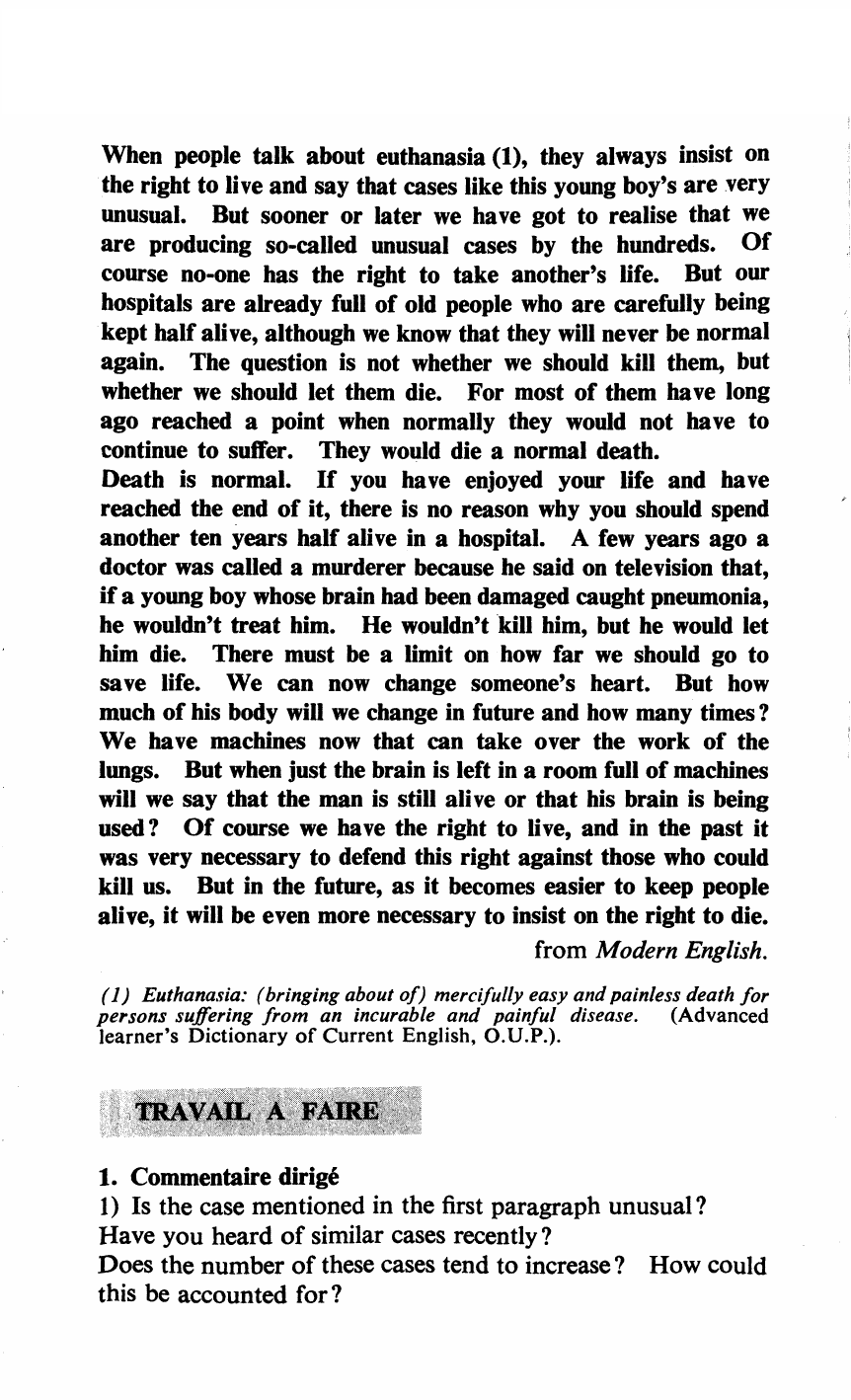THE RIGHT TO DIE
Publié le 07/02/2012

Extrait du document
CORRIGE DU BAC
Recently i read in a newspaper about a five-year-old boy whose brain had been damaged in a road crash. The judge who beard the case pointed out that, although the boy's life bad been saved by the doctors, he doubted wbether they bad done the right thing. The boy would never be able to live a normallife. He would probably live for as many as thirty years in hospital, knowing just enougb about bimself to make him unhappy. When people talk about euthanasia (1), they always insist on the right to live and say that cases like this young boy's are very unusual. But sooner or later we bave got to realise tbat we are produclng so-called unusual cases by the hundreds. Of course no-one bas the right to take another's life. But our hospitals are already full of old people who are carefully being kept balf alive, although we know that they will never be normal again. The question is not whether we should kiU tbem, but whether we should let them die. For most of them bave long ago reached a point when normaUy they would not bave to continue to sutfer. They would die a normal death....
«
When people talk about euthanasia (1), they always insist on
the right
to live and say that cases like this young boy's are very
unusual.
But sooner
or later we bave got to realise tbat we
are produclng so-called unusual cases by the hundreds.
Of
course no-one bas the right to take another's life.
But our
hospitals
are already full of old people who are carefully being
kept
balf alive, although we know that they wiU never be normal
again.
The question is not whether
we should kiU tbem, but
whether
we should let them die.
For most of them bave long
ago reached a point when normaUy they would not bave to
continue to sutfer.
They would die a normal death.
Death is normal.
H you bave enjoyed your Iife and bave
reached the end
of it, there is no reason why you should spend
another
ten years half alive in a hospital.
A few years ago a
doctor
was caUed a murderer because he said on television tbat,
if a young boy whose brain bad been damaged caught pneumonia,
he wouldn't
treat him.
He wouldn't kiU him, but he would let
him die.
There must be a limit on how far
we should go to
save Iife.
We can now change someone's heart.
But how
much
of his body wiU we change in future and how many times?
We bave machines now tbat can take over tbe work of the
lungs.
But when just the brain is left in a room full
of machines
wiU we say tbat the man is stiU ali ve or that his brain is being
used?
Of course we bave the right to live, and in the past it
was very necessary to defend this right against those who could
kill us.
But in the future,
as it becomes easier to keep people
alive,
it will be even more necessary to insist on the right to die.
from
Modern English.
( 1) Euthanasia: ( bringing about of) merci/ully easy and painless death for
persons suffering from an incurable and painful disease.
(Advanced
Jearner's Dictionary of Current English, O.U.P.).
1.
Commentaire dirigé
l) Is the case mentioned in the first paragraph unusual?
Have y ou beard of similar cases recently?
Does the number of these cases tend to increase? How could
this be accounted for?.
»
↓↓↓ APERÇU DU DOCUMENT ↓↓↓
Liens utiles
- The Monroe Doctrine In his annual message to Congress in 1823, United States president James Monroe declared that the United States had the right to exclude foreign powers from colonizing in the western hemisphere.
- 1983, « A Critical Examination of the Theory that the Right to the Throne of Ancient Egypt Passed Through the Female Line in the 18th Dynasty », GM 62, 67-78.
- exposé anglais introduction to the Consumer Society
- Révision DIE DUE PARTIE I - les caractéristiques du droit de l’UE
- Le théâtre a-t-il pour fonction de tout dire, de tout expliquer au spectateur de la crise que vivent les personnages? - Par quels moyens et quelles fonctions Juste la Fin du monde est une pièce qui nous retrace la crise de cette famille?


